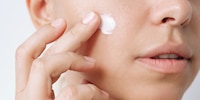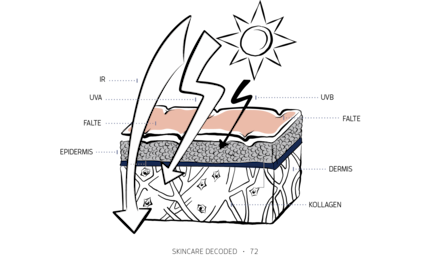
Guide
Healthy skin doesn't need exfoliation - even if social media tells you otherwise
by Mareike Steger

Beauty myths are as stubbornly persistent as some of the skin problems they purport to solve. Chemists Gloria Lu and Victoria Fu have a clear goal: to debunk the cosmetics industry’s misleading promises. The two sat down for an interview about beauty’s biggest misconceptions.
The Californian sun is shining as Gloria Lu and Victoria Fu join our Zoom meeting. Meanwhile, at my end, evening is setting in. Both women wear many hats: they’re authors, influencers and entrepreneurs. Years ago, they worked as chemists at the San Francisco branch of world-leading cosmetics giant «L’Oréal». You can read about their way out of the mainstream beauty industry here. On their platform «Chemist Confessions» and in their book «Skincare Decoded», they demystify the space between advertising promises and science.


They uncover the beauty industry’s false promises, as well as explain cosmetic products and how best to use them. In our interview, they shared their knowledge on the biggest myths in the beauty business.
Gloria: Big myth! Silicones are a huge group of ingredients with different properties. You can’t judge the whole category by the same token. The reason silicones are so commonly used in cosmetics is because they feel great on your skin. Adding just one per cent silicone to a product improves the texture and how it feels on the skin. Silicones are also chemically pure. The chances of them irritating your skin are very low.
Victoria: That’s a big misconception. Moisture is good for oily skin too. Any good moisturiser has an oil base as well as a water one. This helps lock moisture into the skin. Sure, a lot of people don’t like putting oil onto already oily skin. But it does help with things like the acne healing process.
Gloria: Yes and no. It depends on which oils are being used. Clogged pores aren’t an exact science – it’s more a question of probabilities. One thing that does tend to clog the pores is pure coconut oil. With other oils, such as squalane, the chance your pores getting clogged is very low. The oil doesn’t have any smell, and although it comes from olives, it’s much less greasy.
Gloria: Typical scrubs shouldn’t be used more often than once a week, because this method of «peeling» severely irritates the skin. Light chemical peels, however, can be applied every day. Removing old skin is very important for skin health and reduces signs of ageing on the skin too. That’s why it was so important for us to dedicate a chapter of our book to chemical exfoliants. The same rule applies to both scrubs and peels: use it them moderation, and be mindful what you’re using them for. Your face shouldn’t be red or sore afterwards.
Gloria: When it comes to sun protection, we have two rules: «More is more» and «texture wins». If there’s a sun cream you’re willing to apply several times a day of your own accord, that’s the one for you. You should go for something with an SPF of at least 30. An SPF-30 product that feels good on your skin, and which you like using, is more useful to you than an SPF that’s awkward to apply and ends up gathering dust in your medicine cabinet. The idea that the SPF scale is linear is also inaccurate. SPF 50 isn’t twice as effective as SPF 25. Factor 50 blocks 98 per cent of UV rays.

Victoria: If such a thing existed, someone out there would make billions. Our skin ages, that’s just the way it goes. Skin doesn’t just maintain its health from the outside in, it does so from the inside out too. Our lifestyle, environmental factors and genes all influence how quickly our skin ages.
Gloria: In skincare science, we differentiate between intrinsic ageing, which is down to the passage of time, and photoaging. The latter is brought about by external factors, the obvious one being sunshine. All we can do is try to reduce the effects of photoaging by wearing sunscreen, giving the skin enough moisture and quitting smoking. You can also get «anti-agers» such as retinol, which can further reduce photoaging. But we’re all getting older – no product has the ability to stop time.
Gloria: We’d all like that to be true. It all depends on how much your environment changes with the seasons, though. If you’ve found a moisturiser that works well, that really is a good basis. Then it’s just a matter of adjusting your routine here and there to accommodate the seasons. Sometimes your skin needs occlusive substances, which are the ingredients that lock moisture into your skin and keep it there for longer. When that’s the case, you can add a creamy balm to your routine.
Gloria: You don’t have to worry about that too much. Skin-neutral pH just means that the product’s pH level is equal to that of your skin, which is about 5. But most skincare products are based on the pH of your skin anyway.
Victoria: If your skin is prone to irritation, it can be helpful to take a closer look at the pH value of your skincare products. For healthy skin, this isn’t necessary. Remember, your skin has the ability to regulate its own pH level.
Gloria: Several! I have really dry skin, so I spent a lot of money on moisturisers as a student. If a product promised a quick fix, I bought it right away. My philosophy was: the more expensive the product, the more effective it’ll be. Most of these products, however, were water-based, meaning they had no component for retaining moisture in the skin. The result of this, of course, was always drier skin.
Victoria: «Expensive equals good» was a big misconception of mine too. I spent a lot of cash on various products to get my oily skin under control. In doing so, I put my skin through a lot. I gave my acne the wrong treatment for such a long time that the skin on my face was peeling off. Now, I know that for healthy skin, less is often more!
I'm a sucker for flowery turns of phrase and allegorical language. Clever metaphors are my Kryptonite – even if, sometimes, it's better to just get to the point. Everything I write is edited by my cat, which I reckon is more «pet humanisation» than metaphor. When I'm not at my desk, I enjoy going hiking, taking part in fireside jamming sessions, dragging my exhausted body out to do some sport and hitting the occasional party.
Practical solutions for everyday problems with technology, household hacks and much more.
Show all